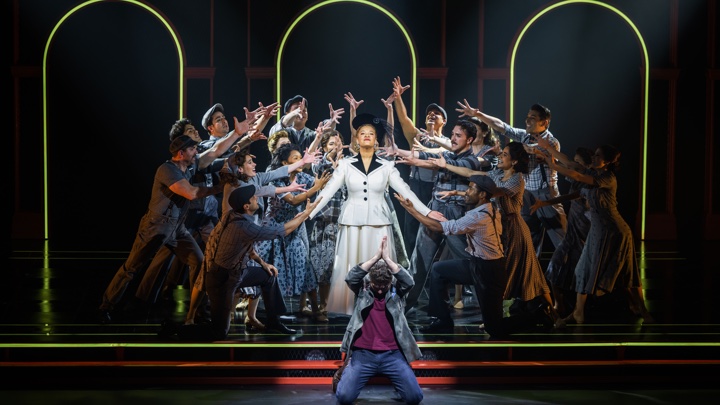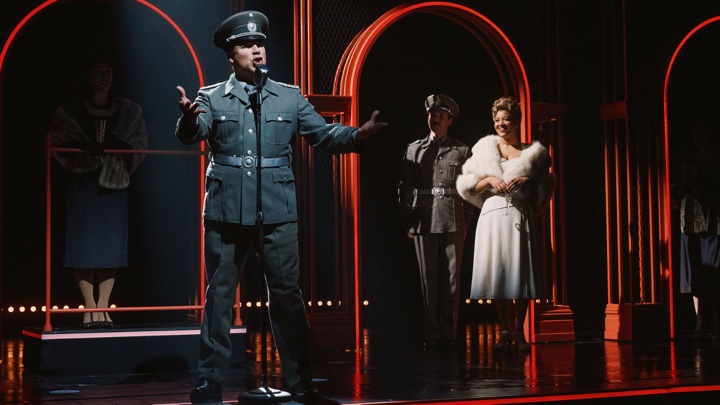

The Eva Perón of their creation is a ruthless, pretentious striver whose sheen of altruism is only attested to by the fanatical chorus that proclaims “Santa Evita!” (while, in this production, revering a suspended Dior dress) and who alternates dropping sums of funny money on luxury imports with gassing up her brooding husband to achieve a success that, in the context of the show, lacks any political raison d’être.
At the end, she succumbs to cervical cancer, sputtering out, “The choice was mine, and mine completely/I could have any prize that I desired/I could burn with the splendor of the brightest fire/Or else, or else I could choose time,” as if cancer and suicide are related.
Despite my love since high school for the original cast recording and a formative memory of seeing Perón’s real-life tomb in Buenos Aires as a child, it pains me to conclude that Evita is the most offensive musical in the repertoire; it’s worse than Billy Bigelow’s slap, the outrageous ethics of Dear Even Hansen, or any of the cloudy, racialized character constructions of West Side Story.
Its Reaganesque rock concert populism, its jaded, direct-address narrator Ché, and the frankly repulsive tessitura for its title character all give the show an import beyond its narrative value by redirecting attention to the body – the body politic, the bodies of the performers, and our bodies sitting in seats. The spectator experience becomes one of complicity, a startling feeling both in the moment and in retrospect.
Yet in Lloyd Webber’s “rock opera,” everyone except Eva herself (and that includes us) is granted the grace of reflection. Evita is the prosperity gospel in tango shoes tried in the court of popular opinion, crucified, and sanctified – that it does this with every performance is testament to the maddening strength of the material and the catchiness of Lloyd Webber’s tunes.
The revival now playing at American Repertory Theater in Cambridge, which then heads to DC’s Shakespeare Theatre Company in the fall, makes no bones about any of the above. This culmination of its long gestation period, which started with a City Center Encores gala in 2019, is a credit to director Sammi Cannold; with keen instincts, she reads the work within a letter of its life and reproduces its vigorous, involving swirl with a spontaneity and decisiveness that often turns overwhelmingly busy.
Instead of a sweeping revision, Cannold’s interventions are on a subtle level: the crouching fear of Juan Perón’s juvenile mistress (an affecting Naomi Serrano, both plaintive and steely in her one-off ballad), Eva’s distributing leaflets for her husband’s campaign, and, most strikingly, the ingenious storytelling use of tango that is both sensual and violent (Emily Maltby and Valeria Solomonoff are choreographers, though the non-tango choreography gets to be excessive).
The production’s musical assets – including glorious new orchestrations from David Cullen for 15(!) players that give Lloyd Webber’s score refreshing timbral innovation without sacrificing its 80s lushness – are well suited to match Cannold’s level of nuance. Connor Wang’s sound design, which pumps cheers of “Peron! Peron!” into the house so clearly they sound like they’re coming from (literally) across the aisle, is the production’s most unsettling and effective design element.
All of this swirls around the protean Shereen Pimentel as Eva; judiciously opting to mix more often than belt to offer a musical characterization that flows remarkably easily and naturally, she inflects her voice with insightful colorings and asserts herself onstage with flare. She’s refreshingly unaffected, vocally secure across an expansive range (she makes a meal out of the punchy “Rainbow High,” and then shows off an attractive, plummy alto register in Evita’s final hour for “You must love me”), and indefatigable.
She may not be a magnetic presence, but she’s an endearing one and her “Don’t cry for me Argentina,” the show’s most overrated aria, found a refreshing stillness amidst an opulent background of roses substituting for faces in a crowd (the dramatically blah, instagrammable sets are by Jason Sherwood; the dramatically blah, greyscale costumes are by Alejo Vietti).
Omar Lopez-Cepero as Ché is a delightful contrast to Pimentel’s effusiveness; he exchanges familiar fervor for a coolness both in manner and in his understated vocal attack. Another one of Cannold’s touches, to temper his furor by providing him with a silent backstory as a disenchanted former-member of Perón’s government, was a smart touch. Cesar Samayoa is bullish and sings with strength as Juan Perón and Sky Vaux Fuller, the lone child in the ensemble, is a standout.
This summer’s musical from ART is hardly the revisionist history Artistic Director Diane Paulus’s 1776 offered last summer, yet it succeeds in giving Evita the infuriating due it deserves. Whether or not you want to take part in that up in Boston or, where it may prove particularly salient, in DC, is entirely up to you.
Photos: A.R.T. Marketing


























Comments